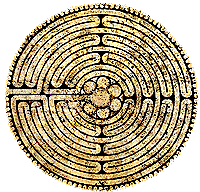|


| ||

|
© 1997-2001 Refiner of Gold Creations | |

|

| |
|
From Mesopotamia comes Jewish relations. Abraham and his offspring adopted certain symbolic representations from their Mesopotamian heritage. The four beasts seen in Ezekiel's vision are the same as those which represent the directions in belief systems throughout the Mesopotamian region. These beasts are repeated in the Four Living Creatures in John the Revalator's vision. From John's vision, they are again repeated in the illustrations of Book of the Kells, and represent the four gospels.
When we look for symbols to describe a new way of life, or a new approach, we look for a "hook" -- something that we can use to connect our knowledge to the existing knowledge of others. This "hook" is a piece of knowledge that exists in the knowledge bank of those around us. For example, if I want to teach computers to a person who has been a homemaker much of her life, I will explain the operation of the computer so that it makes sense to that homemaker. One of my students gave me a very appropriate anaology for this: If I think of it as a window, I can close the "curtain" by clicking on this little "minus" button. Then If I want to open the curtain again, I just click (double-click) on it to open it back up. I had long used the home-office filing cabinet to describe certain features, but this one made a lot of sense. And the same applies to the Hebrews when they left their Mesopotamian home along the Euphrates to the Promised Land. The same symbols that their "Pagan"* relatives used became useful in symbolizing different aspects of their new surroundings. Their belief system had been long associated with these symbols, and they would not give them up so easily. It is sad irony that these same symbols caused them great troubles and tribulations through misuse and misrepresentation. But just the same, if they are used as symbols, they can mean good things. It is when we misdirect our worship from the Creator to his messengers that we begin to lose focus. Yes we should hold his messengers with great reverence and respect, but that does not mean that we seek them when we should be seeking our Creator. "Pagan" is a term universally applied to any religion that is not that of the person using the term; i.e. All religions not Hindu are pagan to the Hindu; all religions not Christian are pagan to the Christian. | |
| |
|


| ||

|
© 1997-2001 Refiner of Gold Creations | |

|

| |